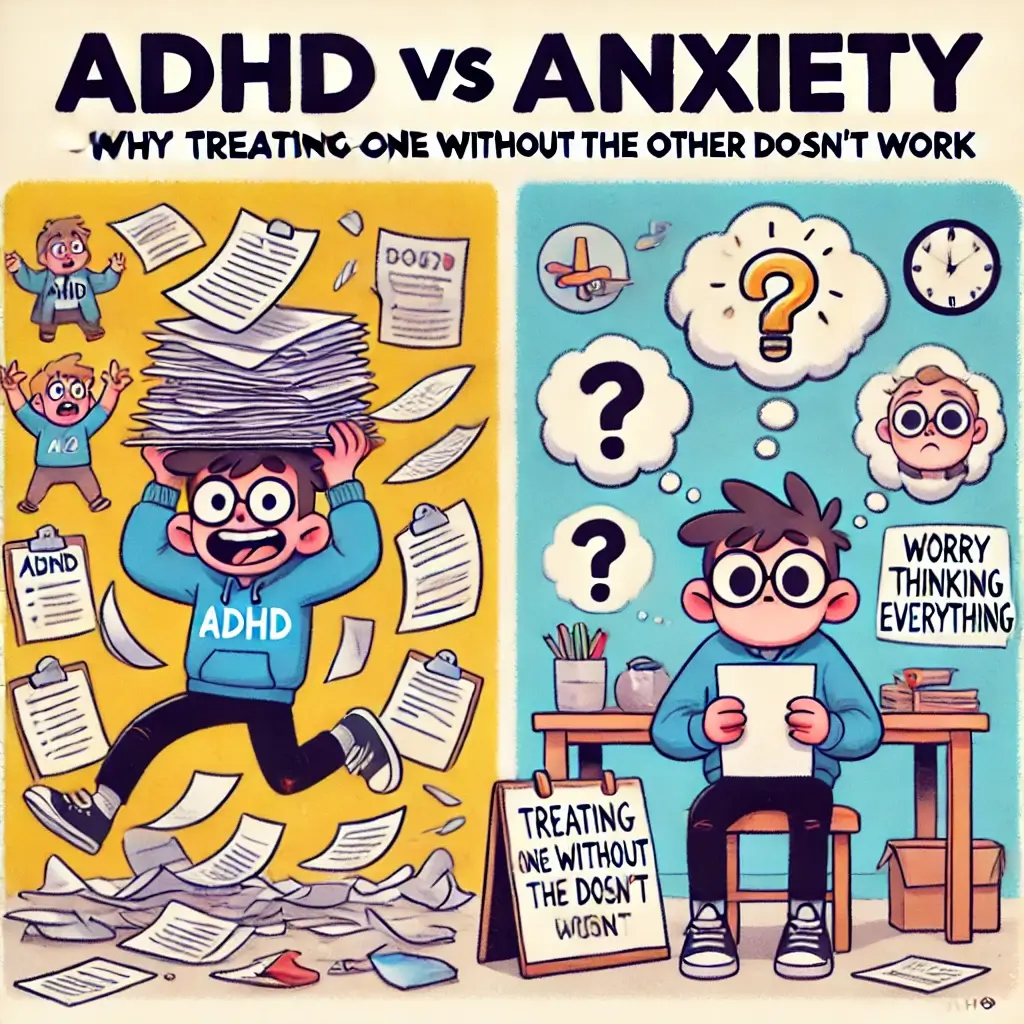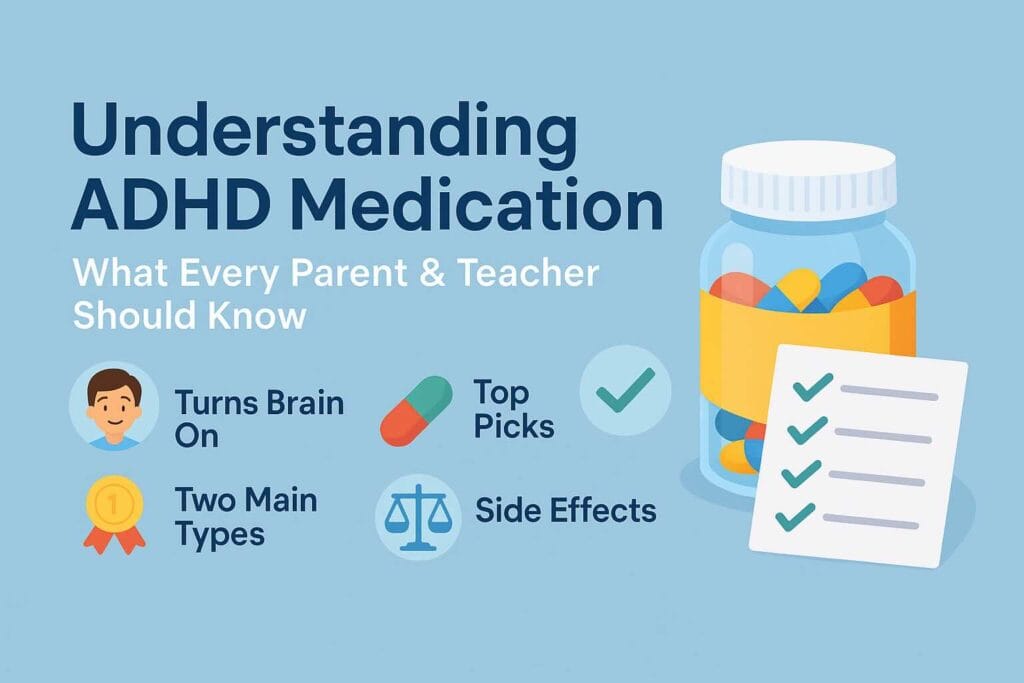ADHD vs Anxiety – Why Treating One Without the Other Doesn’t Work

🧠 ADHD or Anxiety – Or Both? It’s not always easy to tell.
For many adults (and children too), ADHD and anxiety often show up together, but they’re not the same. Have you ever felt like your focus is slipping, you’re restless, or can’t seem to get things done? Is it ADHD making it hard to concentrate, or is it anxiety causing you to overthink and worry?
In fact, untreated ADHD can lead to feelings of constant stress and overwhelm, which over time, evolve into anxiety. On the flip side, anxiety can sometimes look like ADHD: trouble focusing, restlessness, and fidgeting are common in both. So, how can you tell the difference?
👉 Key signs of anxiety: Excessive worry, physical symptoms like headaches or stomach aches, difficulty sleeping, or avoiding certain situations out of fear.
👉 Key signs of ADHD: Difficulty with focus, impulsivity, forgetfulness, or struggling to follow through on tasks.
Many people, especially adults, may have been living with untreated ADHD, with anxiety developing as a result of years of feeling disorganised, overwhelmed, or ‘failing’ to meet life’s demands. Recognising that ADHD and anxiety can be intertwined is the first step in finding the right approach to manage both.
🔑 Here’s the catch: Treating ADHD without addressing anxiety can leave anxiety lingering in the background. This could lead to frustration, a sense of not feeling ‘better’, and the ongoing struggle to manage daily life.
So, what can you do?
✅ If you suspect both conditions are present, it’s important to address both. Cognitive Behavioural Therapy (CBT) is often a key strategy for treating anxiety, and teaching coping skills to manage those worries. In some cases, medication may be needed alongside therapy.
✅ Ignoring anxiety won’t make it go away – it can show up as physical symptoms, emotional stress, and even sleep disturbances that leave you feeling more exhausted.
✅ Recognising the connection between ADHD and anxiety in adults is important. Many parents with ADHD children experience these same struggles themselves! So, if this resonates with you, take the time to care for your mental health, too.
The Bottom Line: You (or your child) deserve treatment for both ADHD and anxiety. Addressing one without the other is like solving only half the puzzle. When we look at the full picture, treatment can lead to better focus, reduced stress, and overall well-being.
✨ Don’t let anxiety silently sabotage the progress you’re making with ADHD management. Seek the support you need – it’s worth it!
🔄 Share this post with someone who might need to hear this. You don’t have to face this alone. We’re in this together!
#ADHDandAnxiety #MentalHealthMatters #YouAreNotAlone #CBTForAnxiety #ADHDAwareness #ADHDSupport #NeurodivergentLife
Managing ADHD and Anxiety in Children: A Holistic Approach
Hi, my name is John Fl, and I’m a pediatrician who dedicates my time to supporting families, children, and educators as they navigate the challenges kids face at school and at home. Today, I want to talk about two common issues I see in my practice: ADHD and anxiety—specifically, how they relate to each other and the importance of addressing both.
The Connection Between ADHD and Anxiety
It’s not uncommon for children with ADHD to also struggle with anxiety, but this connection is often misunderstood. There are two key aspects to consider when discussing ADHD and anxiety:
- Co-occurrence: ADHD and anxiety can often occur together. In fact, studies show that 30 to 50 percent of children with ADHD also experience significant anxiety. If you look at family history, you might find that ADHD and anxiety run in the family, which can help shed light on your child’s condition.
- Secondary Anxiety: Untreated or poorly managed ADHD can lead to anxiety over time. This is especially common in adults who didn’t receive treatment for their ADHD as children. Imagine growing up feeling like you’re not living up to your potential—seeing classmates getting A’s and B’s while you’re struggling to get C’s and D’s, even though you know you’re just as capable. Over time, this kind of frustration can lead to chronic anxiety and feelings of inadequacy.
For many adults, especially women, the demands of family, work, and daily responsibilities pile up. It’s like juggling too many balls. You can handle two, maybe three, but once you add more, things start to fall apart. This leads to feeling scattered and overwhelmed, which is where the anxiety sets in.
Recognizing Anxiety in Children
Anxiety can also manifest in children with ADHD, but it’s important to distinguish between primary anxiety (anxiety as a stand-alone condition) and secondary anxiety (anxiety resulting from untreated ADHD).
Primary anxiety is often inherited and runs in families. I see this in my practice every day—children who are perfectionists, overthinkers, and easily overwhelmed. These kids often have parents who set high expectations, and sometimes, schools and teachers can also add pressure. When children aren’t able to process this stress effectively, it leads to feelings of anxiety and worry.
Anxiety is like an overactive alarm system in the brain. It triggers responses to perceived threats that aren’t actually there, making it hard to focus on anything else. Kids with anxiety may constantly worry about things like upcoming deadlines, being picked up from school, or going to sleep. These worries are different from the inattentiveness of ADHD but can look very similar on the surface.
How to Differentiate Between ADHD and Anxiety
You might be wondering, how can I tell the difference between ADHD and anxiety? After all, both conditions can cause similar behaviors—fidgeting, difficulty focusing, or being easily distracted.
Children with ADHD may seem uninterested, impulsive, or easily distracted, while children with anxiety may appear fidgety or disengaged because they’re overwhelmed with worry. The key is understanding the root cause of these behaviors. Often, children with anxiety have a family history of the condition, and they may also show physical symptoms like stomachaches, headaches, or reluctance to participate in certain activities.
For example, children with anxiety may avoid standing up in front of the class to give presentations or participating in individual sports like swimming. Social anxiety can also make them reluctant to attend school camps or spend time with large groups of people.
The Importance of Treating Both ADHD and Anxiety
It’s essential to recognize that treating ADHD alone is not enough if anxiety is also present. Both conditions are highly treatable, but they require a comprehensive approach.
ADHD medication is incredibly effective, but anxiety management involves more than just medicine. Cognitive behavioral therapy, play therapy, and other forms of counseling can help children learn to manage their anxiety. In some cases, medication may be recommended, but I often find that parents are hesitant to treat their child’s anxiety with medication, even if they’re comfortable with ADHD medications.
This reluctance may stem from a belief that emotional difficulties shouldn’t need treatment, that children should just “get over it.” But this mindset can lead to prolonged suffering. Anxiety is a real issue that requires attention, just like ADHD.
A Holistic Approach to Managing ADHD and Anxiety
Managing ADHD and anxiety isn’t just about medication. It’s about creating a balanced lifestyle for your child that includes:
- Proper sleep hygiene: If your child isn’t getting enough sleep, they’ll wake up anxious and worried. A consistent sleep routine can make a big difference.
- Exercise: Regular physical activity can help reduce anxiety and improve focus.
- Socializing and support: Ensuring your child has a strong support network is crucial for their emotional well-being.
- Parental support: As parents, it’s important to take care of your own mental health. When you’re calm and regulated, you’re better able to support your child.
If any of this resonates with you, I encourage you to seek expert help. ADHD and anxiety are both treatable conditions, and with the right support, your child can thrive. This is what I work with every day, and I’m here to help.



Responses